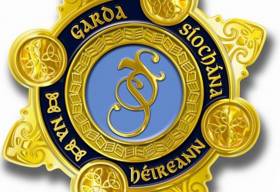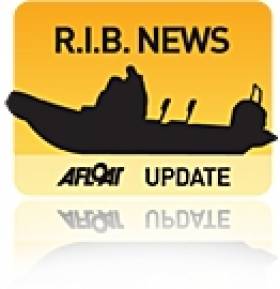Displaying items by tag: outboard engines
Suzuki On Show at RYA Online Dinghy Show
Visitors to the Suzuki booth at this weekend's RYA online dinghy show will find out more about why this brand of outboard engine is proving so popular for use on club safety boats, coaching/chase boats and, of course, leisure craft – including as auxiliary power for larger cruising dinghies and sailboats.
Suzuki will be 'exhibiting' its entire range of four-stroke outboards, which spans from the lightweight and portable DF2.5 to the awesome power of the award-winning DF350A.
Viking Marine and O'Sullivan's Marine are among the Suzuki outboard range dealers in Ireland.
Theft of Outboard Engines – Advice from An Garda Síochána
Over the last 18 months there has been a significant increase in the number of small outboard engines reported stolen to An Garda Síochána nationwide. Most of these engines are stolen while unattended at remote locations on the main Rivers and Lakes of Ireland.
A number of these engines have been recovered by Gardaí in the hands of local and in some cases foreign criminal gangs. These gangs appear to have a good working knowledge of engines and carry with them the necessary tools to remove the engines from their boats.
In some cases they are using boats to access Marinas and loading boat engines onto the boat making good their escape to another part of the Waterways.
The criminal gangs use vans or trailers to carry the stolen boat engines away. Some of these engines have been exported to Europe and beyond. This trend appears to be happening all over Western Europe.
One of the many problems Gardaí have encountered when engines have been recovered is trying to establish the owners.
Unfortunately, when some victims report their property stolen to the Gardai they cannot provide any unique serial number which can be recorded on the Database. This causes difficulties when an engine is recovered. e.g. Gardaí recovered a Yamaha outboard engine with a serial number still visible. However when the serial number was search on the stolen database there was no match. There were, however, over 100 Yamaha engines listed as stolen (described as Yamaha engine). The Gardai never found the owner.
If a unique serial number or other identifying feature is provided to the Gardaí by the owner(s) the property can be identified quickly and returned to its rightful owner. More importantly any suspects caught in possession of the stolen property can be prosecuted.
Garda advise to all owners of boat engines no matter what size is:
Take a note of the engine/serial number and keep it safe. In the event your property is stolen you can provide those details to the Gardaí.
Mark your boat engine with a unique serial number (for e.g. your d.o.b. 10122009). Fix an electronic chip on the engine. There are a number of Companies who can supply electronic chips at very reasonable prices. If possible lock and secure your engine in a lock up or shed. Do not leave it attached to the boat if at all possible.
Your local Crime Prevention Officer can assist with more detailed advice.
Gardai would appeal to members of the public to report any suspcicous activity, no matter how trivial, to local Gardai or the Garda Confidential no. 1800 666 111.
Suzuki Aims to Be Number One Outboard Engine Brand In Ireland in Next Three Years
Suzuki says it has achieved the highest market share in the four stroke outboard sector in Europe last year. It's a proud boast for the engine manufacturer that is also mirrored at home with growing Irish sales.
Sales of Suzuki marine engines in Ireland has been growing year on year for the last six years, according to Suzuki Ireland's Declan Maguire. 'We are not surprised that we are the number one choice for boaters across Europe, as our reliability and fuel efficiency records speak for themselves'.
Maguire says 'with our sustained growth in Ireland, combined with our competitive pricing, we hope to be the number one choice for Irish boaters in the next three years'
From the lightweight and portable DF2.5 to the award-winning power of the DF300AP, Suzuki says they have an outboard for every purpose and to match any transom, so customers really do have a great choice.
The manufacturer launched several new models this year, the most recent being the DF200AP which is the first outboard in the world to feature a keyless start system.
George Cheeseman, Sales & Marketing Manager for Suzuki GB’s Marine Division, said, “We are incredibly proud of this achievement and we congratulate our colleagues at the factory for producing such fantastic outboard motors. We, as a team, are driven to provide our customers with the ultimate in outboard power and with more and more people choosing Suzuki, the team’s tireless efforts really are paying off.” He concludes, “We are looking forward to the remainder of this season and pushing forward with even more exciting products and initiatives.”
Suzuki Marine are exhibiting at the Southampton Boat Show from this morning to the 20th September.
Suzuki’s Four stroke market share in 2014:
Sales results: 44,613
Market share: 28.5%
Source: ICOMMIA
Suzuki Shows off new Outboard Engine Joystick Control
#joystick – Suzuki Motor Corporation has announced that it has a new Joystick Control System in development. The announcement was made earlier this month at the 2013 Japan International Boat Show in Yokohama.
The new joystick system is meant to integrate seamlessly with Suzuki's proprietary drive-by-wire system that is available on the Suzuki DF250AP and flagship DF300AP outboard engine models.
During the Japan International Boat Show, the company showed a prototype joystick control as well as concept drawings of the system and its components.(See above)
According to Suzuki, this new system will provide increased confidence to skippers as they manoeuvre their boats in close quarters and will increase the appeal of boating to a 'younger, more tech-savvy demographic'.





























































